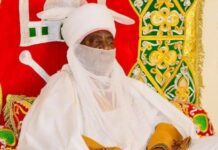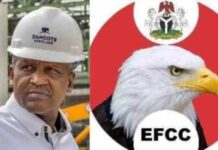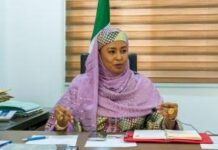Former military head of state, Gen. Ibrahim Badamasi Babaginda (rtd.), has said no sensible military man will plot a coup to topple a democratically elected government in Nigeria in this era.
Babangida said plotting a coup this time around will amount to dragging the country into a lot of problems and sanctions
He said this in an interview with Channels TV last night.
Speaking on a Channels TV interview programme, Babangida, who was a beneficiary of military coup, also faulted the argument that military intervention brought Nigeria to her present unpleasant political condition.
Often called military interregnum for its supposed lack of legitimacy; Nigeria started her journey under military rule six years after independence.
The military interregnum was ‘punctuated’ by civilian rule for just four years when Shehu Shagari ruled from 1979-1983 before he was booted out of power by another coup by Muhammadu Buhari, a military man.
Babangida was one of the longest-serving military rulers, he led Nigeria from 1985 to 1993.
He, however, said a military coup will be greeted with backlash and international sanctions at this time.
“The moment you take over a government, the regional and international bodies will come after you. And everything you want to do in terms of development will not be accepted. You cannot work on your own,” he said.
But in the interview broadcast last night, Babangida said the military cannot be blamed for Nigeria’s problems because it was the civilian governments that instituted a system upon which they operated.
“We didn’t create problems. We tried to provide the framework upon which subsequent governments could build upon. Most of the infrastructural developments… even the democracy, we midwifed it. We were able to capture what the world is doing now and bring them into our own country,” he said.
“I find it silly to say that we created the problems. It is a joint venture between the military and the civilians. You were there to show us how the system works; the institutions of governance and government, all these were civilians’ prerogative.
The Minna-born soldier said the military intervened in governance because of the political instability occasioned by a lack of a nationalistic approach by the leaders of the time.
“You have political parties that wanted to carve a region and call it their own. We didn’t develop this concept of a federal government with the states or the regions,” he said.
“Every region wanted to be on its own. So, that brought about the lack of stability and in the process, we (the military) got involved in a lot of internal security operations, up to the time it culminated in a military coup.
“Fortunately, the military who intervened at that time were all nationalistic. They did not believe in separation. All they had to do was to make sure the various regions remain one, not divided.
The former head of state said Nigeria’s greatest achievement so far is “the fact that we were able to remain one as a country,” especially after experiencing the civil war.
“We tend to talk too much about the problems and do not talk about the solutions to the problems,” he added.
“We talk little about our beliefs, what we stand for and what we want the country to be. We always dwell on the problem. We have a country and we must make it work.”











